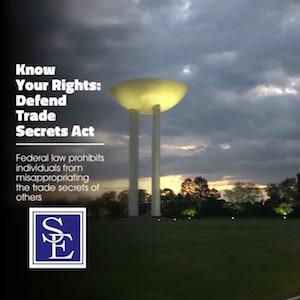OF DISCRIMINATION AND HARASSMENT
Defend Trade Secrets Act
Are you a small business that has learned that a former employee is using your confidential and proprietary information against you? Are you an employee who is being unjustly accused of taking a trade secret from a former employer in order to interfere with your ability to make a living? In either case, there are federal and state laws that govern disputes concerning alleged misappropriation of trade secrets. If you are involved in a business dispute concerning an alleged misappropriation of a trade secret, you should immediately contact an experienced New Jersey employment lawyer who can provide you advice and counsel concerning your legal rights and represent your interests in the complex and often expensive legal dispute.
The federal law governing the misappropriation of trade secrets is called the Defend Trade Secrets Act. President Barack Obama signed the Defend Trade Secrets Act of 2016 into law in May 2016, which is the first of its kind under federal law. Many states have in place their own version of laws designed to deal with the misappropriations of trade secrets. The goal of the Defend Trade Secrets Act is to establish a trade secrets law that applies uniformly across state lines. The law permits a business or owner of a trade secret in the United States to file suit in federal court against an individual or other business from misappropriating the trade secret.
The Defend Trade Secrets Act allows an employer to sue a former or current employer in a private lawsuit for misappropriating trade secrets in the interest commerce or business. Confidential or proprietary information will only be considered a “trade secret” under the Defend Trade Secrets Act if the owner has taken reasonable measures to keep the information secret and that the information derives independent economic value, actual or potential, from not being generally known to, and not readily ascertainable through proper means by, another person who can obtain economic value from the disclosure or use of the information. In order to prove a claim under the Defend Trade Secrets Act, a business must show that the alleged disclosure or use of the trade secret was acquired by illegal means and the alleged disclosure or use of the trade secret was done knowingly and without consent.
For employees, an important provision in the Defend Trade Secrets Act is the Whistleblower Protection provision. 18 U.S.C. 1833 (b). The Defend Trade Secrets Act protects whistleblowers from any type of legal liability when a trade secret is divulged for the purpose of reporting or investigating a suspected violation of law. This means that an employee does not have to fear liability for disclosing information an employer would consider secret in advancing concerns or complaints of unlawful conduct in the workplace. This law extends to include independent contractors and consultants as well. The whistleblower immunity provision eradicates the threat to an employee of having to defend trade secret litigation for reporting concerning illegal conduct. Such insulation of an employee allows them to complain about perceived violations of law or misconduct without hesitation or concern for retaliatory legal action. The Defend Trade Secrets Act helps prevent retaliation and further encourages people to bring forth violations of law, in confidence, to their employer, attorney or governmental agency.
The Defend Trade Secrets Act further requires employers to include a notice of whistleblower immunity in employment contracts with employees, contractors or consultants, prospectively from the time of its enactment in May 2016. The notice must advise that an individual cannot be held civilly or criminally liable for the disclosure of trade secrets when such a disclosure is made to investigate or report a suspected violation of law. This is an important provision that provides employees with additional protections from retaliation for reporting believed misconduct or violations of law. Whistleblowers now have an effective way to come forward without fear of intimidation or retaliation.
The Defendant Trade Secrets Act recognizes the importance of protecting persons from retaliation in the workplace for reporting misconduct in the workplace. If you have knowledge of unlawful conduct in the workplace and need attorney assistance, please call our office to speak with one of our New Jersey employment lawyers about the facts and circumstances of your particular matter.






